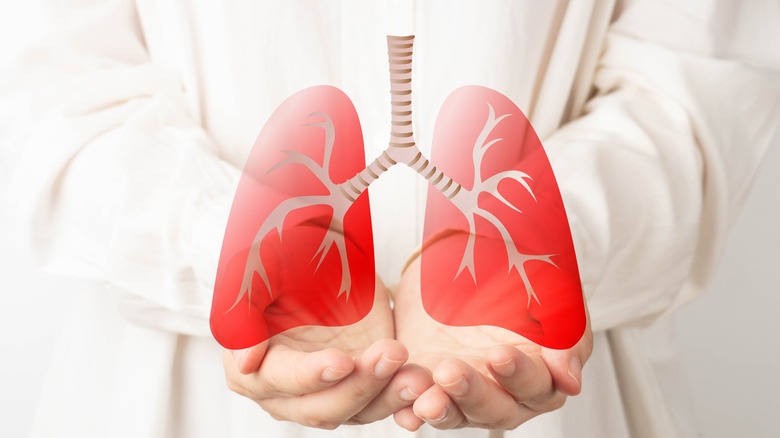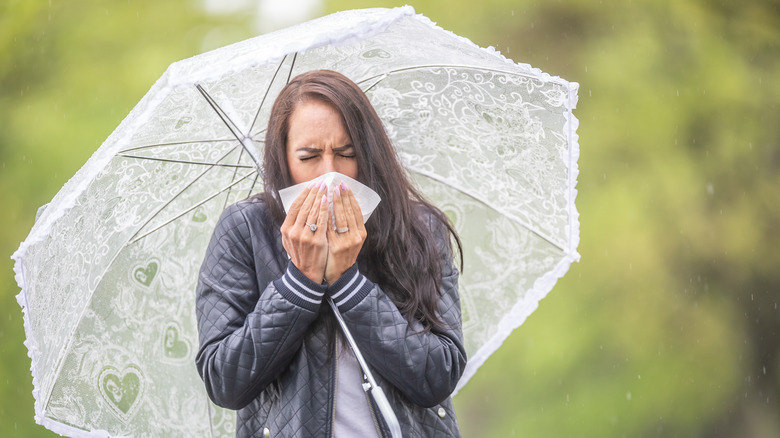Symptoms Of Pneumonia You Shouldn't Ignore
What do puppeteer Jim Henson and actor Leslie Nielsen have in common? Besides being famous men in the broad field of entertainment, both died because of pneumonia. Yes, we sometimes throw around the phrase "you'll catch pneumonia" when someone isn't bundled up well enough. But the real disease can be life-threatening, which is why preventative steps like vaccination are key. But, sometimes, you can still get sick.
As Johns Hopkins explains, pneumonia is a type of infection where the alveoli or air sacs in our lungs become clogged with fluids and pus. Since your circulatory system receives oxygen directly from your alveoli, it's easy to see why pneumonia can be dangerous. Seeking medical help as soon as you suspect you have pneumonia is crucial, especially since there is more than one type of pneumonia and treatments can vary. For example, you can develop pneumonia if you have the flu, a viral disease. However, you can also get pneumonia from bacterial or fungal infections.
So, do all types of pneumonia have the same symptoms? Yes and no. There are symptoms that are common for different types of pneumonia, specific symptoms and severity can vary from person to person (via Johns Hopkins). This is why it's important to not self-diagnose things like a cough or muscle pain. Remember, it's better to have a health care professional tell you it's something else than to learn on your own that you have pneumonia.
Shortness of breath
Imagine a college senior is late for the first day of their internship. Frantically, they bolt through the front door of the office building, only to discover that the elevator is not working. They run as fast as they can up five flights of stairs, making it to their desk with seconds to spare. This bit of bad luck has left them out of breath, but they'll be fine. But now imagine someone having just as much difficulty breathing while sitting still in a chair.
As the American Lung Association explains on their website, there are many reasons why someone may experience shortness of breath. But difficulty breathing that happens without warning and for no apparent reason like working out could be a sign of pneumonia. Remember, pneumonia causes the air sacs in your lungs to become at least partially clogged (via Johns Hopkins Medicine). The more those sacs are filled, the less room there is for air.
Although shortness of breath can be a sign of pneumonia, it can also be a symptom of several other serious health issues (via American Lung Association). For example, sudden breathing issues could mean you have a blood clot in one or both of your lungs. You also could be having a heart attack, panic attack, or asthma attack. Regardless of what's behind your shortness of breath, seek medical assistance right away.
Wet cough
We all need to cough from time to time. Heck, we sometimes clear our throats just to get someone's attention. But if a cough comes with discolored mucus or blood, you might have pneumonia (via American Lung Association).
Just so there's no misunderstanding, a healthy person coughs to help keep their body free of germs and irritants (via American Lung Association). However, constant or acute coughing could be a sign of a lower respiratory tract infection. And as Johns Hopkins points out, pneumonia can be caused by both viruses and bacteria. In fact, if you have a lower respiratory tract infection, you might first develop bronchitis where the tubes in your lungs become inflamed. If left untreated, the infection can worsen into pneumonia.
While not every cough automatically means you have pneumonia, you should watch for mucus that is either green or yellow (via American Lung Association). In addition, if you have blood in your mucus, seek medical help as soon as possible. An acute cough can also be a sign of an upper respiratory tract infection like the flu (via American Lung Association). Influenza can become pneumonia if it's not properly treated before the infection has a chance to spread and worsen (via American Lung Association).
Dry cough
Believe it or not, you can technically have pneumonia and not cough (via Medical News Today). And although wet coughs involving mucus are a typical symptom of pneumonia, it is also possible to have a dry cough producing no mucus (via American Lung Association).
According to University of Michigan Health, a dry cough sometimes occurs as a result of Mycoplasma pneumonia. Although this type of lung infection is caused by bacteria, it's separated into a different category from bacterial pneumonia on Johns Hopkins' website. In fact, Mycoplasma pneumonia is more commonly called atypical pneumonia or walking pneumonia because its symptoms tend to vary from other forms of bacteria-caused pneumonia (via MedlinePlus). Although atypical pneumonia tends to be milder than other pneumonias, it nevertheless requires medical attention.
A dry cough can also happen if someone has influenza (via University of Michigan Health). Keep in mind that the flu can escalate into pneumonia, so even if you suspect your dry cough is flu-related, you should still take it seriously (via American Lung Association). Dry coughing can also be a sign of other health issues like the common cold and whooping cough, as well as a side effect of certain drugs.
Fever with chills
If you think about it, having a higher-than-normal body temperature and feeling chilled to the point that you shake and your teeth chatter seem like a strange combination. And yet it can and does happen for a number of ailments including the flu, strep throat, and, yes, pneumonia (via Healthline). But don't just accept this symptom as part of your body's healing process.
As Dr. Charles Dela Cruz, director of the Center for Pulmonary Infection Research and Treatment in New Haven, tells Health, having both a fever and chills can mean that bacteria might be growing in your body. And as Healthline points out, both bacterial and viral infections can give you a fever that leaves you shivering.
Of course, pneumonia is only one reason you might experience a fever accompanied by chills (via Healthline). That said, if you are feverish and shaking, you should wait no more than 48 hours to seek medical help, especially if this symptom doesn't lessen or if you have other issues like difficulty breathing and severe coughing. Don't try to self-diagnose your symptoms. If you make a mistake, you could lose valuable time and allow an infection to spread.
Chest pain
It's not surprising that the first fear that flashes through most people's minds when they or someone they know experiences chest pain is a heart attack. And, yes, sometimes heart issues are the reason for this frightening sensation (via Healthline). But keep in mind that your chest houses more than just your heart.
As Healthline explains, it's possible to have chest pain because of problems with your lungs. You could be feeling pain in your chest because of pneumonia or viral bronchitis. As the American Lung Association explains, bronchitis can worsen and become pneumonia. Even if your chest pains are not being caused by pneumonia, that doesn't mean you won't develop it, especially if viruses are involved.
Besides pneumonia, bronchitis, and heart attacks, chest pain can also occur because of shingles, acid reflux, panic attacks, and issues with your pancreas and gallbladder (via Healthline). For asthmatics, pain in the chest is a typical side effect of their airways constricting. And besides your organs, injured ribs can also cause chest pain. In short, you should never ignore a pain in your chest and seek quick medical help to have it diagnosed and treated.
Low body temperature
When you have an infection like pneumonia, your body might run a fever as it tries to fight off the bacteria, viruses, or fungi invading your systems (via Johns Hopkins). However, not only can some people develop pneumonia and not experience a fever, their body temperature might actually drop.
As Dr. Sarina Sahetya, a pulmonologist and intensivist at Johns Hopkins Medicine, explains to AARP, "In people who are older, who tend to have weaker immune systems or who are immunosuppressed, instead of getting the immune system revved up, the infection [pneumonia] actually can cause low temperatures." According to Medical News Today and the National Heart, Lung, and Blood Institute, infants who contract pneumonia can also have lower body temperatures.
Whether your pneumonia gives you a fever or a lower-than-normal body temperature, it's crucial to not ignore this symptom. As Medical News Today and the American Lung Association note, pneumonia can cause respiratory failure, abscesses on the lungs, and sepsis, a potentially fatal condition that can make your organs stop functioning properly. Lower body temperatures can be just as dangerous as fevers. So, monitor and track your temperature and give that information to your health care professional.
Fatigue
Being sick can be exhausting. Your body is fighting back foreign invaders spreading throughout your system (via Johns Hopkins). But shrugging off fatigue as just a side effect of the healing process could be a dangerous decision.
According to WebMD, fatigue is a serious enough symptom of pneumonia that you should reach out for medical help as soon as possible. It could be a red flag for possibly life-threatening complications. Excessive fatigue might mean that not enough oxygen is reaching your organs. With pneumonia, the air sacs in your lungs become at least partially clogged with fluid. These compromised air sacs might lead to both heart and respiratory failure. And if you have bacterial pneumonia, it's possible for the bacteria to get inside your heart and cause heart failure.
In addition to heart and lung failure, fatigue can also signal that your lungs have developed abscesses (via WebMD). Fortunately, this can be treated with either antibiotics or by physically removing the pus. However, the longer you wait to get treatment, the more complicated your condition can become.
Blue lips
For Rick and Morty, encountering a character with blue lips is just another crazy adventure. But for us non-toons, lips or a face that are an unnatural shade of blue can be a sign of cyanosis, a condition where you experience low levels of oxygen (via Verywell Health). And, if you guessed that cyanosis is a possible symptom of pneumonia, you'd be 100% correct.
According to Verywell Health, cyanosis can technically happen to multiple parts of the body, including the earlobes and the tongue. But blue lips are a common occurrence for someone with lung problems. So, if you look like you're wearing blue lipstick, you might have pneumonia or a pulmonary embolism, a potentially deadly issue where a blood clot or clots are inside your lungs (via Verywell Health and American Lung Association).
Besides pneumonia, blue lips can indicate a number of serious health concerns, including asthma, carbon monoxide poisoning, heart issues, and sleep apnea (via Verywell Health). In addition, it is possible for your lips to change color because of medicines or toxins. However, this is considered pseudocyanosis and does not involve reduced oxygen flow. Nevertheless, don't assume your blue lips are the result of pseudocyanosis — seek medical assistance.
Blue fingernails
While wearing nail polish can discolor your nails, that doesn't mean that health problems can't also change their appearance. Case in point: pneumonia is one of many conditions that can turn your fingernails blue (no polish required) (via Healthline).
As Healthline explains, pneumonia can cause cyanosis, where not enough oxygen is reaching an area of your body (in this case, your fingers). In addition to pneumonia, cyanosis-related blue fingernails can occur if you have asthma, a blood clot or blood clots in one or both of your lungs (also known as pulmonary embolism), carbon monoxide poisoning, and chronic bronchitis. Blue fingernails can also be a symptom of heart failure, as well as a blood vessel condition known as Raynaud's phenomenon. So, no matter what you suspect the underlying cause might be, get yourself to a health care professional right away if your fingernails suddenly start changing color for no apparent reason.
Muscle pain
Think about the last time you didn't feel well. Whether it was the flu or just being under the weather, chances are you felt achy. Your muscles might have even hurt a bit. This type of soreness is such a common side effect of being sick that it's sometimes shrugged off as an inconvenience. Yet not only could it be a symptom of pneumonia, but it could also be alerting you to basic needs your body is not receiving.
According to Medical News Today, the flu and pneumonia (especially viral pneumonia) can have almost identical symptoms, especially when a case of pneumonia is just starting to develop in your body. And, yes, one of these early symptoms can be muscle pain. But beyond that, sore, achy muscles can also occur if you don't get enough sleep, which is crucial to feeling better (via Medical News Today). In addition, muscle pain is a side effect of being dehydrated, an all too common health problem that can happen while your body fights off infection.
Besides physical issues that can come with pneumonia and cause muscle pain, there's also an emotional one: stress. As Medical News Today points out, feeling stressed while your immune system is working overtime can lead to muscle pain. Now, it's easier said than done to not stress out while you're ill, but treating yourself to distractions like reading, watching TV, and listening to music can all help.
Arthritis
Now, before you panic, having arthritis does not automatically mean you have or are more likely to contract pneumonia. And although arthritis is a possible symptom of a pneumonic infection, it's classified as a rare one (via Healthline). But there is a specific form of highly contagious pneumonia where you might experience arthritis.
As Healthline explains, Mycoplasma pneumonia (also known as atypical or walking pneumonia) is a form of pneumonia that's very easy to transmit from person to person. In fact, if you hear on the news about a pneumonia epidemic, then odds are good that it's Mycoplasma pneumonia (via Johns Hopkins). The scary part is if you're experiencing arthritis as a result of walking pneumonia, then it's possible your infection has spread to your central nervous system.
Since both muscle pain and arthritis can occur because of pneumonia, it's important to be able to differentiate between the two. According to the Mayo Clinic, arthritis usually involves both swelling and tenderness in the affected joint, much different from general muscle aches. Regardless, if you have arthritis because of atypical pneumonia or another medical problem such as lupus or gout, you should speak with your health care professional.
Loss of appetite
Sometimes the last thing you want to do when you're sick is eating. If you're congested, then you can't smell the food well. If you're feeling exhausted, then all you want to do is rest, not stuff your face. However, poor appetite is a symptom of multiple types of pneumonia.
There are different types of pneumonia, all of which can decrease your appetite (via Healthline). Yet, although it can be difficult to eat and drink if you have any form of pneumonia, you still need to take in nutrients and fluids in order to give your body what it needs to fight off the infection. Fortunately, Medical News Today has a few suggestions to help with this miserable state. This includes tips like drinking protein shakes or healthy smoothies, as well as reducing the size of meals but increasing their frequency. That way, your body and especially your immune system will have the strength it needs to combat your illness.
Delirium
Delirium is not categorized as a disease, nor is it usually permanent (via Cleveland Clinic). However, if someone begins suddenly acting confused and is unable to focus, this can be a sign that they have pneumonia.
First, it's important to understand not only what delirium is but also what it isn't. Specifically, delirium is not dementia, which involves the gradual development of long-term memory issues. Delirium is more about a person's short-term attention span and can be the result of pneumonia or related health issues like fever, difficulty sleeping, and dehydration (via Healthline). In addition, if a person is displaying signs of delirium like disorientation or being unable to think clearly, then they could also have a urinary tract infection or a case of sepsis.
Even though delirium is temporary and not a disease, it's still important to seek medical help right away if this symptom presents itself. What's more, some individuals are more likely to experience delirium. So, if a person has vision or hearing issues, takes more than one medicine, uses catheters, is going through alcohol or drug withdrawal, or has had a stroke, then they're more likely to become delirious if they also contract pneumonia.
Pink eye
According to Penn Medicine, pink eye (also known as conjunctivitis) is potentially a symptom of viral pneumonia. In fact, the CDC cautions that adenoviruses can cause both pink eye and pneumonia. That said, viruses are not the only possible connection between conjunctivitis and pneumonia.
As the Cleveland Clinic explains, pink eye can also be caused by a type of bacteria known as Streptococcus pneumoniae. This same bacterium is the culprit behind such health problems as pneumonia, meningitis, and sinusitis (via CDC). In fact, the Iowa Department of Public Health states on its website that this germ is the common culprit behind children's ear infections and sepsis, as well as pneumonia in seniors and those with compromised immune systems.
The bottom line is there are viruses and bacteria that can cause both conjunctivitis and pneumonia. Because of this, if your eyes are turning pink and irritated, then it's time to seek medical assistance. You especially don't want to wait since both conjunctivitis and pneumonia can be easily spread to others.
Nausea and vomiting
Often when we think of pneumonia, one of the first symptoms that comes to mind is breathing problems. But that's not always the case. For example, according to the Children's Hospital Colorado, it's possible for pneumonia to affect the lower area of the lungs and not cause breathing issues. But an infection in this area may lead someone to experience other health problems like abdominal pain or vomiting, or even just an upset stomach (via Nemours Kids Health). Furthermore, Nemours Teens Health explains that vomiting could result in a sick person needing hospitalization. Why? In part because vomiting can make it harder for someone to take certain medicines. Also, when someone vomits, they lose fluids, which can cause severe dehydration. And don't forget that newborns and infants can also catch pneumonia, and even though they don't always show symptoms, vomiting can be a red flag that they're sick, per the Mayo Clinic.
















